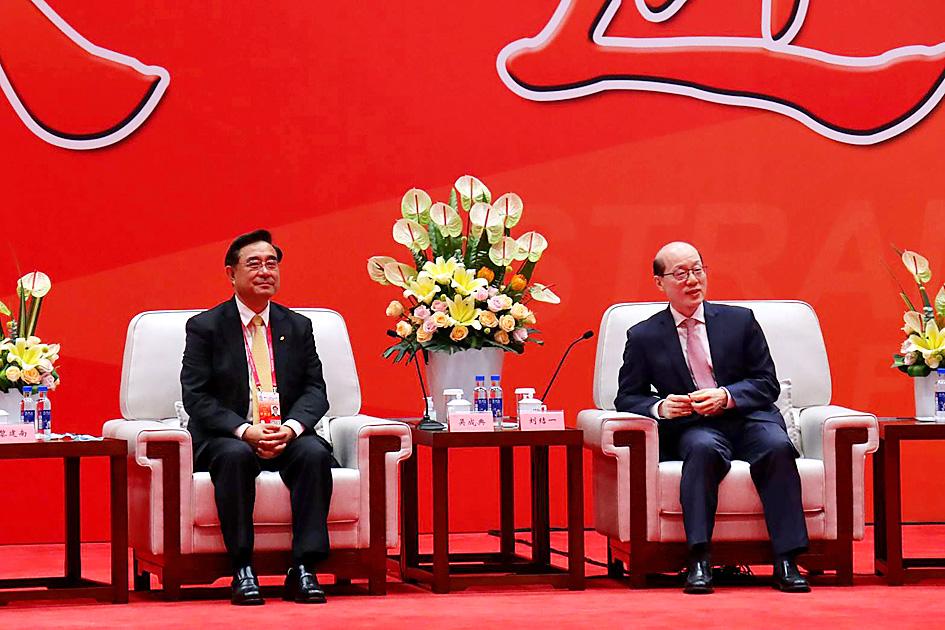Taiwanese delegates to the annual Straits Forum did not get a meeting with the chairperson of the Chinese People’s Political Consultative Conference (CPPCC) for the first time in the 11-year history of the cross-strait platform.
Instead, Taiwan Affairs Office Director Liu Jieyi (劉結一) met with the visitors — who included New Party Chairman Wu Cherng-dean (吳成典) and People First Party adviser Li Jian-nan (黎建南) — yesterday morning, ahead of the opening ceremony in Xiamen, instead of CPPCC Chairman Wang Yang (汪洋).
Lee Cheng-hung (李政宏), president of the China-based Association of Taiwan Investment Enterprises on the Mainland, and Lu Li’an (盧麗安), a Taiwan-born representative to the Chinese Communist Party’s (CCP) 19th National Congress, also attended the meeting.

Photo: CNA
However, Wang did send a video message that was played at the forum in the afternoon, reiterating Beijing’s usual line of opposition to Taiwan’s independence and adding that under the “1992 consensus” based on the “one China” principle, the two sides of the Taiwan Strait are to develop cross-strait cooperation and promote unification.
It was learned that Beijing decided not to send Wang to the forum and to have Liu receive the delegation after the Chinese Nationalist Party (KMT) decided not to send an official delegation this year over what most Taiwanese viewed as a demeaning remark by the host of a China Central Television (CCTV) program.
A headline banner during the program summarized host Li Hong’s (李紅) comments as: “With the Strait on the brink of war, this man is coming to the mainland to plead for peace,” referring to former legislative speaker Wang Jin-pyng (王金平), whom the KMT had picked to head its delegation.
The KMT asked Li to apologize, but then decided not to send an official party delegation, although its members were free to go on their own.
The so-called “1992 consensus,” a term former Mainland Affairs Council chairman Su Chi (蘇起) in 2006 admitted making up in 2000, refers to a tacit understanding between the KMT and the CCP that both sides of the Strait acknowledge there is “one China,” with each side having its own interpretation of what “China” means.
Additional reporting by Chen Yu-fu

US climber Alex Honnold is to attempt to scale Taipei 101 without a rope and harness in a live Netflix special on Jan. 24, the streaming platform announced on Wednesday. Accounting for the time difference, the two-hour broadcast of Honnold’s climb, called Skyscraper Live, is to air on Jan. 23 in the US, Netflix said in a statement. Honnold, 40, was the first person ever to free solo climb the 900m El Capitan rock formation in Yosemite National Park — a feat that was recorded and later made into the 2018 documentary film Free Solo. Netflix previewed Skyscraper Live in October, after videos

NUMBERS IMBALANCE: More than 4 million Taiwanese have visited China this year, while only about half a million Chinese have visited here Beijing has yet to respond to Taiwan’s requests for negotiation over matters related to the recovery of cross-strait tourism, the Tourism Administration said yesterday. Taiwan’s tourism authority issued the statement after Chinese-language daily the China Times reported yesterday that the government’s policy of banning group tours to China does not stop Taiwanese from visiting the country. As of October, more than 4.2 million had traveled to China this year, exceeding last year. Beijing estimated the number of Taiwanese tourists in China could reach 4.5 million this year. By contrast, only 500,000 Chinese tourists are expected in Taiwan, the report said. The report

Temperatures are forecast to drop steadily as a continental cold air mass moves across Taiwan, with some areas also likely to see heavy rainfall, the Central Weather Administration (CWA) said. From today through early tomorrow, a cold air mass would keep temperatures low across central and northern Taiwan, and the eastern half of Taiwan proper, with isolated brief showers forecast along Keelung’s north coast, Taipei and New Taipei City’s mountainous areas and eastern Taiwan, it said. Lows of 11°C to 15°C are forecast in central and northern Taiwan, Yilan County, and the outlying Kinmen and Lienchiang (Matsu) counties, and 14°C to 17°C

STEERING FAILURE: The first boat of its class is experiencing teething issues as it readies for acceptance by the navy, according to a recent story about rudder failure The Hai Kun (海鯤), the nation’s first locally built submarine, allegedly suffered a total failure of stern hydraulic systems during the second round of sea acceptance trials on June 26, and sailors were forced to manually operate the X-rudder to turn the submarine and return to port, news Web site Mirror Daily reported yesterday. The report said that tugboats following the Hai Kun assisted the submarine in avoiding collisions with other ships due to the X-rudder malfunctioning. At the time of the report, the submarine had completed its trials and was scheduled to begin diving and surfacing tests in shallow areas. The X-rudder,